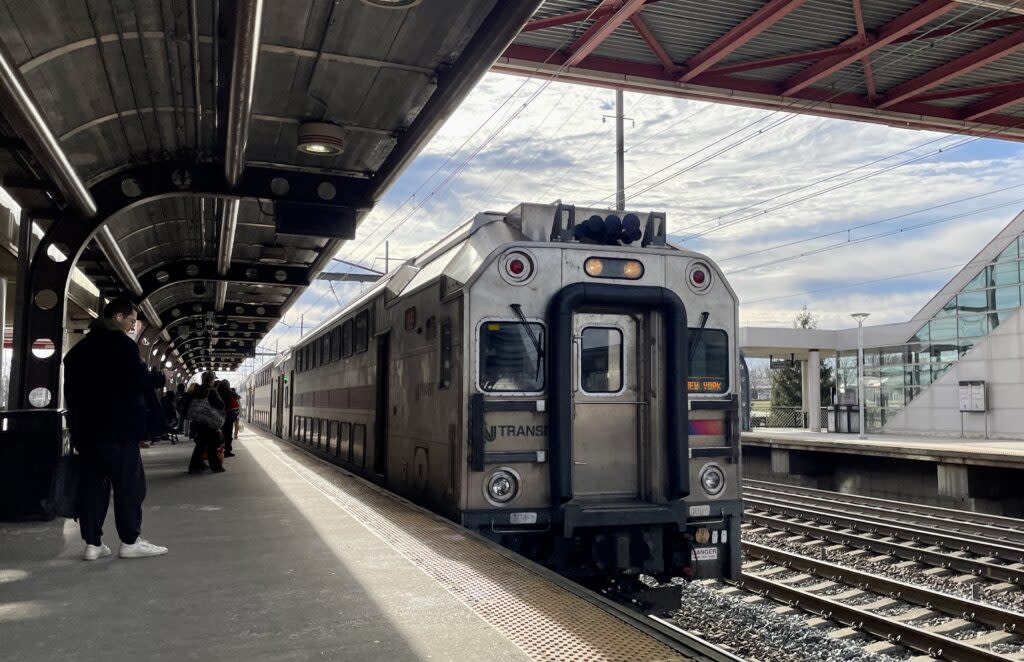NJ Transit approves $3B budget amid outcry over fare hikes

Fare hikes closed a fiscal cliff at NJ Transit, and a tax on businesses will bridge next year's far larger funding gap. (Dana DiFilippo | New Jersey Monitor)
NJ Transit’s board approved a $3 billion operating budget that will spend the last of the agency’s federal COVID-19 relief dollars and is expected to sharply raise fare collection revenue following the agency’s first fare hikes since 2019.
Agency officials during a Wednesday board meeting predicted farebox revenue that has struggled to recover from a post-pandemic ridership loss would rise 22% to $947 million, due mostly to a 15% fare hike approved in April.
Some critics again urged the agency to reverse course on fare hikes, pointing to recent reliability problems that have snarled trains on the northeast corridor repeatedly over the last month.
“The people of New Jersey do not deserve this, and they definitely don’t deserve to pay extra for it. I urge the board to reconsider these fare hikes and do better by their riders,” Stephanie Chernyavsky, a fellow at the Tristate Transportation Campaign, told the board Wednesday.
The board approved the budget unanimously and without discussion.
Simultaneous with the fare hike, the board in April imposed a 30-day expiration window for NJ Transit tickets — there was no expiration date for tickets under a prior policy — and ended a flex pass program that allowed riders to buy 20 one-way tickets with a 20% discount.
Though fares are NJ Transit’s single largest source of revenue, the agency’s other funding is still largely a patchwork of diverted state funds or, for the moment, a bequeathment of federal dollars.
The agency’s operating subsidy from New Jersey’s general fund remains largely static from the prior fiscal year, rising just $3 million to $145 million, and an annual diversion from a clean energy fund remains fixed at $70.1 million.
Revenue that NJ Transit draws from advertising space, parking, concessions, and similar sources is forecasted to rise 8.8% to $131.7 million. Agency officials expect an anticipated increase in ridership will boost its non-fare commercial revenue by, for example, increasing concession sales.
The New Jersey Turnpike Authority will send NJ Transit $455 million under a 2021 deal that called for the authority to transfer nearly $3.6 billion to the beleaguered transit agency over seven years.
The last of that money will reach NJ Transit’s coffers in fiscal year 2028. The agency could face a fiscal cliff the following budgetary year as a result, though its possible growth and annual 3% fare hikes the board approved in April will prevent another funding crisis.
The agency will receive $505.4 million in reimbursements from state, federal, and other sources for non-routine maintenance.
Nearly $750 million in federal money provided by a range of COVID-19 federal stimulus bills will round out the agency’s new budget, but that money is the last of the $4.4 billion in federal dollars that carried the agency through staggering ridership losses during the pandemic.
The loss of those funds creates a roughly $767 million fiscal cliff in the agency’s next budget that lawmakers expect to fill with collections from a new corporate business surtax they enacted in late June.
That fee imposes a non-marginal 2.5% tax on businesses with more than $10 million in profits and is expected to generate roughly $800 million a year. That tax is due to sunset on Jan. 1, 2029, roughly six months after the Turnpike Authority’s agreement lapses.
The surcharge is effective in the current fiscal year, but its first year of collections will support spending in New Jersey’s budget before a statutory dedication sends that money to NJ Transit beginning in July 2025.
“The corporate transit fee provides an additional dedicated funding source that not only allows us to avert the projected fiscal cliff in FY26 but will provide stability and predictability for our operating budget for some years to come,” NJ Transit CEO and President Kevin Corbett told the board Wednesday.
The $3 billion in spending NJ Transit’s board approved represents an increase of roughly 4.7% over the prior year and is driven largely by non-payroll expenses.
The agency’s material supply costs and miscellaneous expenses are forecasted to rise by 7.1% to $205.6 million and $324.4 million, respectively.
Costs for purchased transportation — contracted busses, light rail, and on-demand transit through Access Link — are expected to rise 7% to $288.7 million.
The agency expects fuel and power costs will rise slightly slower at 6.3%, to $156.4 million, and its costs for outside services will rise by an even more languid 5.2%, to $246.9 million.
Payroll and benefit costs, NJ Transit’s single-largest pool of expenses, will rise slower than any other, increasing by 3.4% to nearly $1.8 billion.
Those costs could rise further if NJ Transit and locomotive engineers who’ve worked under an expired contract since 2019 finally reach an agreement. If they don’t, those locomotive engineers could strike near the end of the fiscal year.
NJ Transit separately approved nearly $1.7 billion in capital spending for the 2025 fiscal year Wednesday.
GET THE MORNING HEADLINES DELIVERED TO YOUR INBOX
The post NJ Transit approves $3B budget amid outcry over fare hikes appeared first on New Jersey Monitor.


